11 Aug2020
By Robert Floden

The Michigan State University (MSU) College of Education has served as editorial home of the Journal of Teacher Education (JTE) for almost six years. With the editorship have come benefits, both to the editorial leaders and to our college. To handle the large number of manuscripts that come to JTE each year, we recruited a team, with four faculty co-editors (all at MSU), a half-dozen or so faculty associate editors (some at MSU, some at other institutions), and a part-time staff member as managing editor. We also had a rotating annual appointment of a junior faculty member as assistant editor, and two part-time graduate assistants.
As a part of the editorial team, faculty members contributed to scholarship on teacher education by making decisions and providing guidance to authors, both of which ensured that the publications in JTE were substantial contributions to the field, using high quality scholarship to address important issues. Editorial team members also had opportunities to participate in writing the editorials included in each issues—editorials that were then frequently cited by other scholars.
23 Jul2020
By Stephen Canipe
 When the COVID-19 pandemic began, many teachers, students, and parents rushed to navigate online learning. Some schools may reopen with social distancing guidelines in place, while others may incorporate a virtual component. To limit COVID-19 exposure while maintaining the quality of education for students, educators will need to embrace online instruction.
When the COVID-19 pandemic began, many teachers, students, and parents rushed to navigate online learning. Some schools may reopen with social distancing guidelines in place, while others may incorporate a virtual component. To limit COVID-19 exposure while maintaining the quality of education for students, educators will need to embrace online instruction.
Navigating new technology can be a big hurdle for veteran teachers. As many school districts are announcing plans to incorporate virtual learning for the upcoming school year, there will be little time for teachers to prepare. Seasoned educators will need a lot of training to master remote instruction and help their students succeed.
Teacher candidates enrolled in online programs can help bridge the gap. These candidates have developed technology skills and experienced asynchronous learning, which puts them in a great position to pivot to remote teaching. With 50 years of experience in distance education and online learning, Walden University faculty are prepared to provide teacher candidates with the knowledge and experience needed for online instruction in PreK-12 schools. Walden even helps teacher candidates develop and practice their skills for the classroom through virtual reality training simulations.
17 Jul2020
By Monika Jo
Since AACTE and Mursion launched the Education Roundtable series, we have had the pleasure of showcasing the work of educators, who have integrated teacher training via virtual reality (VR) simulation into their respective programs or are studying the various aspects of this modality.
In an upcoming three-part mini-series, Carrie Straub, executive director of education programs and research at Mursion, will host a team from Harvard Graduate School of Education (HGSE) who have generously offered to share the magic behind their work. They will upack and discuss the following:
- Recruiting and training simulation specialists
- The development of simulations including how participants are oriented into Mursion experiences, models for simulation designs, and post simulation activities aimed at transferring skills
- The development of four simulations developed through the Reach Every Reader grant which HGSE designed to develop teachers as critical thinkers and learners in the classroom alongside their students
02 Jul2020
By Ward Cummings
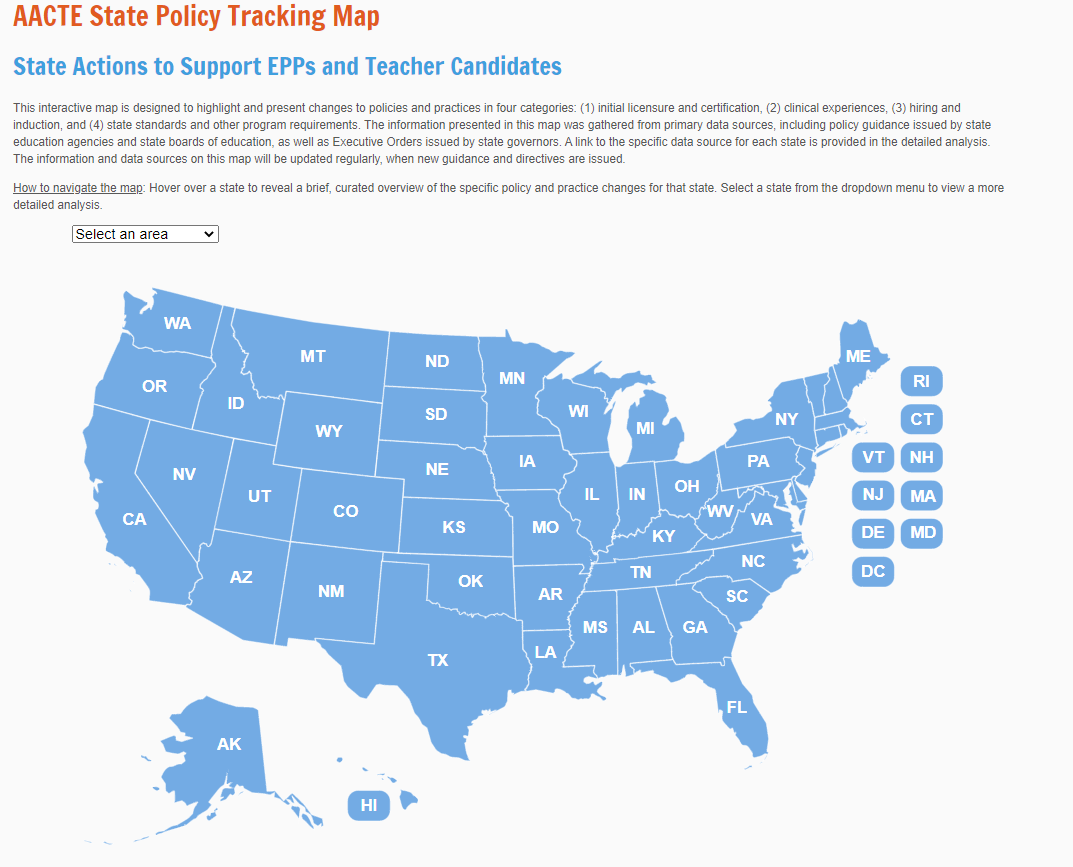 AACTE is excited to introduce its short tutorial video on how to navigate the new State Policy Tracking Map recently added to the AACTE COVID-19 Resource Hub. The easy to use map provides an analysis of state-issued guidance impacting standards and practice, new teacher induction, clinical practice and licensure. The tutorial offers a walkthrough of how to access and use the information provided in three formats: short bullet points, short-form distillations, and links to the original source material.
AACTE is excited to introduce its short tutorial video on how to navigate the new State Policy Tracking Map recently added to the AACTE COVID-19 Resource Hub. The easy to use map provides an analysis of state-issued guidance impacting standards and practice, new teacher induction, clinical practice and licensure. The tutorial offers a walkthrough of how to access and use the information provided in three formats: short bullet points, short-form distillations, and links to the original source material.
AACTE is among the first education associations to track and publish this information, which was collected from multiple sources: news reports, state press releases, executive orders issued by state governors and statements issued by state departments of education. AACTE also included information from state chapter leaders who participated in the shaping of EPP guidance in their state. As state legislatures begin to convene and engage on this issue, we will update the map to reflect their work.
The AACTE National Office has begun to analyze the information collected for the map and is compiling its findings in a soon-to-be released report. Teaching in the Time of COVID: State Recommendations for Preparation and New Teachers will summarize changes by EPPs in response to the COVID-19 public health crisis, seek opportunities for improvement, and propose recommendations to manage the pandemic successfully.
In the meantime, AACTE encourages you to visit the State Policy Tracking Map and invites you to share any questions, concerns, or updates you may have regarding the information presented on the map.
02 Jul2020
By Meghan Grenda

To ensure you have continual access to the many resources available to members, AACTE encourages you to renew your AACTE membership for 2021 today. Members who submit 50% of their dues by August 31, 2020 are eligible for a complimentary second registration to the 2020 Washington Week and 2020 Leadership Academy events. This means if you and a colleague are planning to attend one of these meetings, the second registration for the same event is free.
30 Jun2020
By Monika Jo
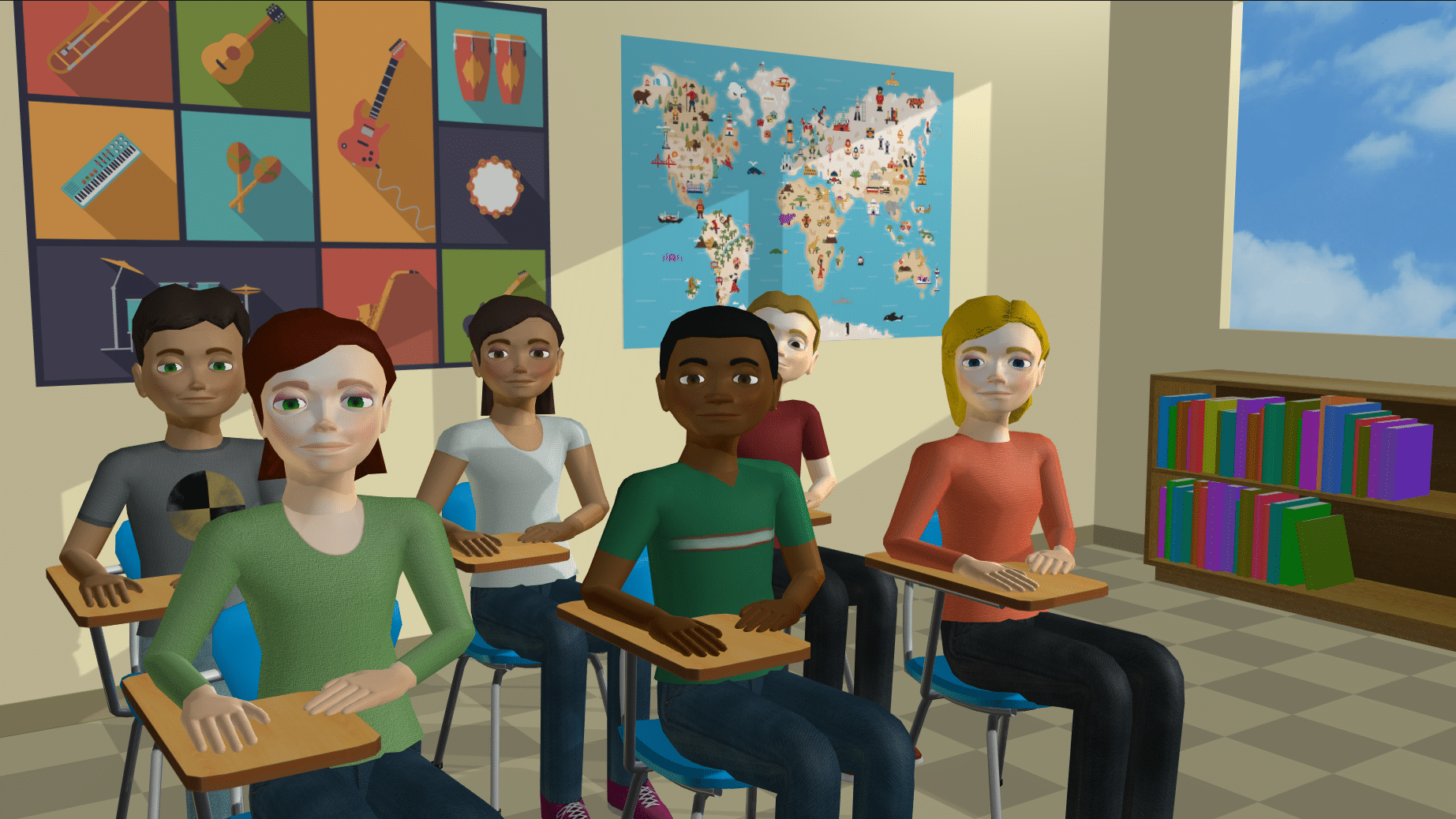 Face-to-face clinical field experience cancelled? Find out how teacher candidates can safely practice instructional strategies through virtual reality (VR) classrooms.
Face-to-face clinical field experience cancelled? Find out how teacher candidates can safely practice instructional strategies through virtual reality (VR) classrooms.
Join the AACTE and Mursion co-sponsored webinar, “Feasibility & Utility of Mixed Reality Simulations in Higher Education,” presented by guest speakers from AACTE and Kennesaw State University tomorrow, Tuesday, June 30 at 1:00 p.m. ET. The presenters will share their wealth of experience using mixed reality solutions and will engage in critical dialogue on the feasibility and utility of mixed reality simulations in higher education. You will discover how virtual simulations help teacher candidates develop high-leverage practices before entering real-world clinical experiences.
25 Jun2020
By Daniel Bergman

Like many educators, I experienced a crash course in teaching via Zoom during 2020. More than another technological tool, videoconferencing has helped me rethink and refine my pedagogical practice—for both online and face-to-face settings.
Classroom Norms
In my typical class sessions, we jump into instruction and activities to model “on-task” productivity. However, Zoom has reminded me that giving attention to procedures and expectations is time well spent.
In a videoconference setting, these “norms” often relate to technical set up—microphones, chatroom, camera, etc. Such issues relate to all sorts of teaching environments. How can students use phones or other devices? What should they write down or record? When and how do they talk with one another and the instructor? These are all important questions, and answering them at the start establishes expectations for successful learning (Finley, 2013).
22 Jun2020
By Monika Jo

Are you curious to find out more about what it’s like to incorporate Mursion into your program, including how to recruit and train your own simulation specialist? Come hear AACTE member institution Southern Methodist University (SMU) share their experiences as a licensee of the Mursion simulation platform during the Education Roundtable on Tuesday, June 23, at 1:00 p.m. ET. Register to attend (or to receive the link to the recording of the event).
The webinar will feature SMU’s Jillian Conry, research and evaluation coordinator, and Paige Ware, associate dean and professor of education. They will share how Mursion can be used in a number of flexible ways: as a tool for practicing skills and receiving feedback, as a way to evaluate specific teaching competencies, and as a way to create shared experiences that enrich classroom conversations.
22 Jun2020
By Lynn M. Gangone

This article originally appeared in eCampus News.
With the onset of coronavirus (COVID-19), school districts, institutions of higher education, and educators are finding themselves in uncharted territory. COVID-19 hit hard and fast. And with that, so did the shift from in-school instruction to online learning, which brought to light very complicated issues and inequities.
The onset of remote learning has magnified the disparity between students who have access to computers and internet and those who do not. The digital divide in our communities, particularly among children from underrepresented and low socioeconomic communities, raises questions that need to be answered.
What technologically based tools make a difference? What context is critical for successful introduction and integration of such tools? What scale of implementation might be possible?
18 Jun2020
By Meghan Grenda

In light of the pandemic, it is now more important than ever to lean into your networks and communities. As a member of AACTE, you can connect with peers, learn from their experiences, and participate in ongoing conversations about educator preparation. In addition to the many benefits of an AACTE membership, below are a few new member resources to assist you and your organization during these uncertain times:
- COVID-19 Resource Hub – Learn how peers are transitioning to distance learning, participate in webinars, and access the latest research about online and virtual instruction.
- COVID-19 Educator Preparation Policy Tracker Map – This interactive map details state policy changes related to licensure and certification, clinical experience, hiring, and state standards and program requirements. It also provides state guidance to EPPs on how to adjust to programmatic changes resulting from COVID-19.
- Mursion Virtual Reality Classrooms – AACTE members receive special rates to Mursion Virtual Reality Classrooms. These classrooms provide virtual simulations so your teacher candidates can still complete clinical practice requirements during the pandemic.
Renewal Incentives
Your AACTE membership is active through December 31, 2020. However, we encourage you to renew for 2021 today. AACTE understands that many of our members are currently facing operational challenges, and as such, we are offering several renewal incentives.
15 Jun2020
By Katrina Norfleet
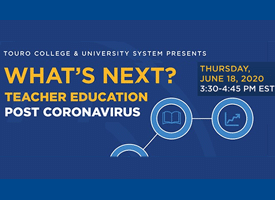 To address this trying time for education in general, and teacher education specifically, the Graduate School of Education at AACTE member institution Touro College will present a virtual discussion with leaders in the profession as they contemplate what comes after sheltering in place for teacher preparation.
To address this trying time for education in general, and teacher education specifically, the Graduate School of Education at AACTE member institution Touro College will present a virtual discussion with leaders in the profession as they contemplate what comes after sheltering in place for teacher preparation.
AACTE Board member Jacob Easley II, dean of the Touro College’s Graduate School of Education, will moderate the session. Panelists include Judy Beck, president of the Association of Teacher Educators and dean of the School of Education, University of South Carolina; past AACTE Board Chair Wanda Blanche J. Blanchett, Graduate School of Education
Wanda J. Blanchett, former AACTE board chair, Graduate School of Education, Rutgers University; and Rene Antrop-Gonzales, incoming dean and professor, School of Education, SUNY New Paltz.
RSVP to join the webinar, “What’s Next? Teacher Education Post Coronavirus,” on Thursday, June 18, 3:30-4:45 p.m. EST.
26 May2020
AACTE Responds to COVID-19
By Ward Cummings
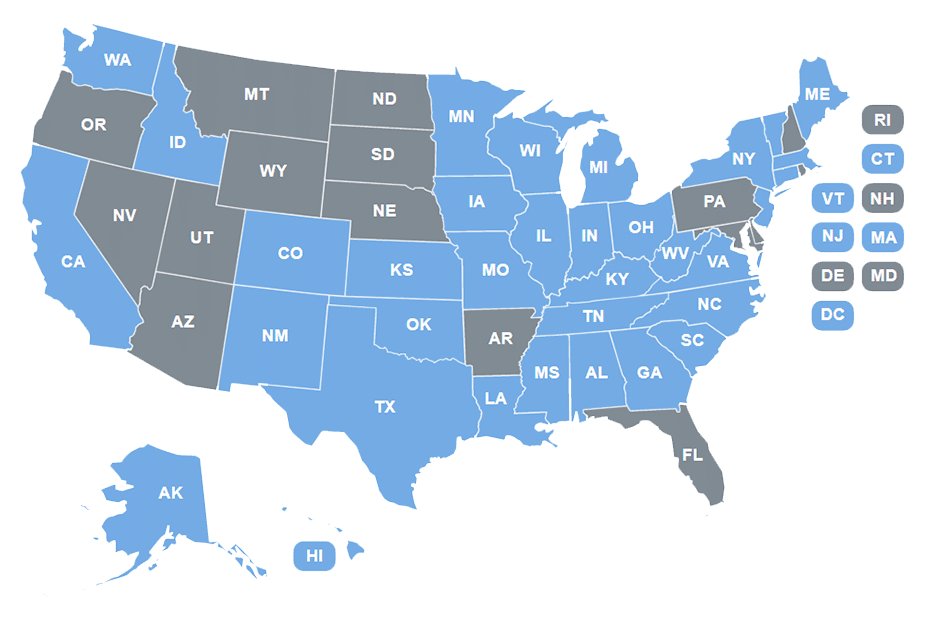 As part of its continued efforts to inform members about the latest developments regarding educator preparation programs (EPPs) in light of COVID-19, AACTE has updated its Policy Tracker Map to reflect recent changes in EPP-specific state guidance and recommendations. These changes include guidance analysis of 12 new states, specifically Arkansas, Delaware, Florida, Maryland, New Hampshire, Rhode Island, Pennsylvania, Arizona, Nevada, South Dakota, North Dakota, and Wyoming. We have also updated data for New Jersey, which recently issued new guidance waiving edTPA.
As part of its continued efforts to inform members about the latest developments regarding educator preparation programs (EPPs) in light of COVID-19, AACTE has updated its Policy Tracker Map to reflect recent changes in EPP-specific state guidance and recommendations. These changes include guidance analysis of 12 new states, specifically Arkansas, Delaware, Florida, Maryland, New Hampshire, Rhode Island, Pennsylvania, Arizona, Nevada, South Dakota, North Dakota, and Wyoming. We have also updated data for New Jersey, which recently issued new guidance waiving edTPA.
In the coming weeks and months, as agency guidance is supplemented by the supporting instructions and recommendations of other state entities, such as the legislature and regulatory bodies, the information and features of this interactive map will grow to accommodate those developments.
26 May2020
By Monika Jo
 Would teachers find professional development via simulated classrooms useful? This was one of three questions that Toni M. Smith, principal researcher, and Rachel Garrett, senior researcher, from the American Institutes for Research (AIR), explored in the Simulated Instruction in Mathematics Professional Development (SIM PD) Study. The following are excerpts from a summary of their research findings and from what they shared at a May 14, 2020 online event hosted by Mursion, whose virtual reality learning platform was used in the study.
Would teachers find professional development via simulated classrooms useful? This was one of three questions that Toni M. Smith, principal researcher, and Rachel Garrett, senior researcher, from the American Institutes for Research (AIR), explored in the Simulated Instruction in Mathematics Professional Development (SIM PD) Study. The following are excerpts from a summary of their research findings and from what they shared at a May 14, 2020 online event hosted by Mursion, whose virtual reality learning platform was used in the study.
Funded by the Charles and Lynn Schusterman Family Foundation, SIM PD is a pilot of an exciting, new PD program being conducted by AIR. SIM PD offers opportunities for teachers in grades 4–7 to (a) learn about questioning strategies and facilitation of student discourse to promote engagement and understanding of math concepts and (b) practice implementing those approaches using a mixed-reality classroom.
They randomly assigned 16 partnering schools to either participate in SIM PD or continue with business-as-usual professional learning during the 2018-19 school year. They collected documentation of SIM PD activities during implementation and video-based observations of math lessons from both groups of teachers.
21 May2020
AACTE Responds to COVID-19
By David Slykhuis, Liz Kolb, Lisa Dieker, Jon Clausen, Michael McVey and Robert Moody
This past March, face-to-face instruction was canceled as universities began to implement emergency procedures for remote teaching due to COVID-19. In response, AACTE’s Committee on Innovation and Technology (ITC) presented a webinar with guidelines for emergency remote teaching. Constituents can view that webinar and access additional resources.
The purpose of this blog post is to revisit the webinar guidelines with suggestions that can be incorporated into planning for 2020-21 blended or online instructional implementation plans:
Needs Assessment
Survey faculty and students to identify digital inequities and access needs. Develop easy to use support system for devices, reliable Internet access, and technical support.
Use Your Current Tools
If face-to-face instruction is not an option, now is not the time to revamp the current learning systems. Universities should encourage faculty to use the same tools (e.g., your Learning Management System) prior to and during COVID-19. Encourage instructors not to overwhelm students with too many new tools. Select a few versatile tools (e.g., Google Suite) and encourage innovative integration throughout a course or program.
21 May2020
By Jacqueline E. King, Ph.D.
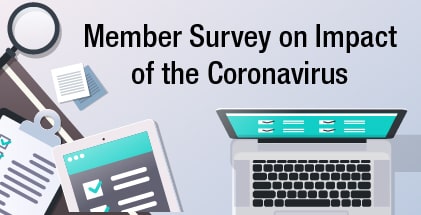 AACTE conducted a survey in April to better understand and assist members as they respond to the coronavirus pandemic. The survey yielded valuable insights about how the pandemic is affecting educator preparation now and the concerns that leaders anticipate as they look ahead to the 2020-21 academic year.
AACTE conducted a survey in April to better understand and assist members as they respond to the coronavirus pandemic. The survey yielded valuable insights about how the pandemic is affecting educator preparation now and the concerns that leaders anticipate as they look ahead to the 2020-21 academic year.
On May 27 from 4:00 to 5:00 p.m. ET, AACTE is hosting a webinar on the survey results. During this session, you will be able to
- review the survey results
- benchmark your experience against that of your colleagues
- discuss the challenges you are facing—and how you are overcoming them—with your colleagues








 When the COVID-19 pandemic began, many teachers, students, and parents rushed to navigate online learning. Some schools may reopen with social distancing guidelines in place, while others may incorporate a virtual component. To limit COVID-19 exposure while maintaining the quality of education for students, educators will need to embrace online instruction.
When the COVID-19 pandemic began, many teachers, students, and parents rushed to navigate online learning. Some schools may reopen with social distancing guidelines in place, while others may incorporate a virtual component. To limit COVID-19 exposure while maintaining the quality of education for students, educators will need to embrace online instruction. AACTE is excited to introduce its short
AACTE is excited to introduce its short 
 Face-to-face clinical field experience cancelled? Find out how teacher candidates can safely practice instructional strategies through virtual reality (VR) classrooms.
Face-to-face clinical field experience cancelled? Find out how teacher candidates can safely practice instructional strategies through virtual reality (VR) classrooms.



 To address this trying time for education in general, and teacher education specifically, the Graduate School of Education at AACTE member institution Touro College will present a virtual discussion with leaders in the profession as they contemplate what comes after sheltering in place for teacher preparation.
To address this trying time for education in general, and teacher education specifically, the Graduate School of Education at AACTE member institution Touro College will present a virtual discussion with leaders in the profession as they contemplate what comes after sheltering in place for teacher preparation. As part of its continued efforts to inform members about the latest developments regarding educator preparation programs (EPPs) in light of COVID-19, AACTE has updated its
As part of its continued efforts to inform members about the latest developments regarding educator preparation programs (EPPs) in light of COVID-19, AACTE has updated its  Would teachers find professional development via simulated classrooms useful? This was one of three questions that Toni M. Smith, principal researcher, and Rachel Garrett, senior researcher, from the American Institutes for Research (AIR), explored in the Simulated Instruction in Mathematics Professional Development (SIM PD) Study. The following are excerpts from a summary of their research findings and from what they shared at a May 14, 2020 online event hosted by
Would teachers find professional development via simulated classrooms useful? This was one of three questions that Toni M. Smith, principal researcher, and Rachel Garrett, senior researcher, from the American Institutes for Research (AIR), explored in the Simulated Instruction in Mathematics Professional Development (SIM PD) Study. The following are excerpts from a summary of their research findings and from what they shared at a May 14, 2020 online event hosted by  AACTE conducted a
AACTE conducted a